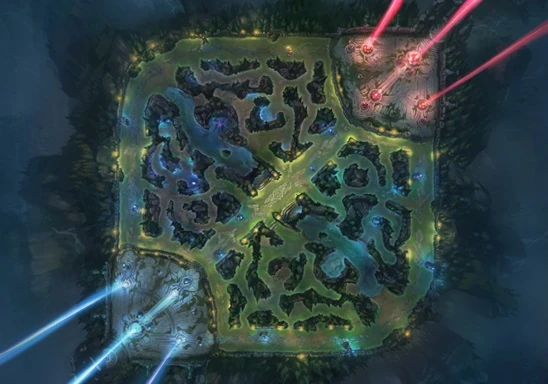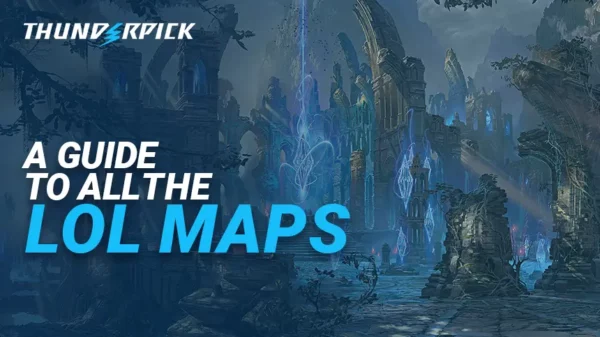Looking for the ultimate guide to each and every one of the LoL maps? You’ve found it! As Riot Games’ flagship Multiplayer Online Battle Arena (MOBA) title, it’s safe to say that you’re likely familiar with the chaotic harmony of its tactical gameplay. And if you’re a longtime player, you may know that our journey transcends Summoner’s Rift.
In this guide, we’ll explore more mesmerizing landscapes of Runeterra, from the frost-bitten expanse of Howling Abyss to those that once echoed the roars of battle. After all, mastering these maps will pave the way to victory. So, let’s dive into the strategic tempest of League of Legends.
And if you want to make good use of this knowledge, you can always try some LoL betting.
Summoner’s Rift
Summoner’s Rift is the most iconic 5v5 arena when it comes to LoL maps. It is revered for its challenging gameplay and strategic complexity. More than just a map, it is a grand stage for champions eager to showcase their tactical prowess. It’s also the sole competitive map in LoL esports.

Lanes
Despite updates and reworks, Summoner’s Rift’s layout has remained stable. The map mimics the Dota 2 map, divided into the top lane, mid lane, and bottom lane, each snaking its way toward the ultimate objective: obliterate the opponent’s Nexus.
While this seems easy enough, triumphing in LoL is a test of strategy and teamwork. Players must defeat enemy champions in teamfights, earn gold by slaying minions, and navigate a map littered with defensive structures: Turrets and Inhibitors, which stand guard inside and outside each team’s base.
Territories
The Rift map is bisected into Blue and Red sides by a winding river, which creates a neutral territory that intersects every single lane. Each team’s base is on the opposing side of the map and is home to shopkeepers that sell essential items for gold, which is required for progression.
The Rift’s jungle is rife with neutral monsters of varying difficulty, and it offers gold and buffs to junglers who defeat them. This labyrinth is also the dwelling of Baron Nashor, a formidable monster that grants the powerful “Hand of Baron” buff to all living members of the team that defeats it.
In addition, there is a range of Elemental Dragons, including Chemtech, Cloud, Elder, Hextech, Infernal, Mountain, or Ocean Rift variants. Slaying these elite neutral monsters offers various powerful buffs, boosting your champion’s power and adding an extra layer of strategy to the match.
Conquering the Rift
Navigating Summoner’s Rift demands tactical planning, decisive action, and team coordination. Mastery involves more than just understanding the map’s layout; it also requires solid knowledge of champs, their abilities, and adapting strategies to the shifting tides of a match.
Taken together, this intricate blend of strategy, teamwork, and high-octane action upholds League of Legends as a pre-eminent figure in the global esports circuit. So, tread with wisdom and skill, use every distinctive feature, and take command of the battlefield. The Rift awaits your command.
The Howling Abyss (Proving Grounds)
Howling Abyss is another iconic League of Legends map designated to the “All Random All Mid” (ARAM) game mode. It offers fast, action-packed gameplay compared to normal games, with its single-lane compelling endless skirmishes. However, the objective is the same as Summoner’s Rift.
Map Features
The map has several unique features. It’s set atop a narrow bridge that spans a bottomless chasm in the frigid, harsh depths of Freljord. In ARAM, champions are assigned randomly, but players can reroll them using reroll points, adding a layer of strategy right from the start.
Every player spawns at Level 3 with 1,400 starting gold and a Poro-Snax, a fun item used to feed the friendly Poros roaming the map. Recalling is disabled, and players can only recover lost HP or mana using potions, Health Relics, or certain champs’ abilities.
Shopkeepers
Shopping is also limited in Howling Abyss, preventing players from buying items after leaving the fountain at the start or respawning. This forces players to be strategic with their initial item purchases and champion upgrades. Further complicating the arena is the absence of neutral monsters.
While this simplifies the landscape of the Howling Abyss in League of Legends, it also focuses more on relentless team fights and less on objective control. This makes ARAM a perfect game mode for those craving non-stop action and a streamlined, yet complex version of LoL.
Discontinued And Event LoL Maps
The LoL universe features many maps and rotating game modes. While not all are as timeless as Summoner’s Rift, it’s worth holding onto anticipation that one may come back. Given Riot Games’ penchant for surprises, there’s a chance these discontinued maps could return in future patches.
Here’s a brief breakdown of some of the more notable event maps in League of Legends.
Butcher’s Bridge
Butcher’s Bridge was an ARAM map that replaced Howling Abyss. Its objective, like others, was to destroy the enemy Nexus through a single path while collaborating with teammates to overcome enemy defenses. Its design was a reflection of Bilgewater’s theme of haphazard upkeep and rough charm.
Crystal Scar
Crystal Scar is a discontinued LoL map designed for the Dominion game mode. It featured a capture-and-hold style gameplay on a circular map with five capture points. Teams would fight for control, damaging the enemy Nexus proportional to the number of captured points.
Nexus Blitz
Temple of Lily and Lotus—a temple of the amphibious vastaya Canghapi tribe—was added for a new game mode called Nexus Blitz. This new map was situated in Ionia and comprised a single lane, forking in the middle, with jungles for dual-jungle cooperation.
Nexus Blitz was famed for its fast-paced gameplay. Matches could be surrendered after the eight-minute mark, Recall is faster, and Homeguard is available from Level 1. The map’s charming shopkeepers are Spirit Blossom Kami Featherknight and Spirit Blossom Yokai Melisma.
The Twisted Treeline
Twisted Treeline, the second classic LoL map, offered a faster, bloodier 3v3 game format focused on small-scale skirmishes and ganking. The map had a horizontal layout with two flanking lanes and a neutral jungle area. Victory was achieved by destroying the enemy teams’ base’s Nexus.
Honorable Mentions
But that’s not all. Here are a few more discontinued maps that some players may remember:
- Cosmic Ruins (Dark Star: Singularity)
- Crash Site (Odyssey: Extraction)
- Substructure 43 (Project: Overcharge)
- Rings of Wrath (Arena Mode)
- Magma Chamber (Unreleased)
Put Your LoL Map Knowledge To The Test
LoL features a menu of captivating battle arenas, each a testament to the game’s dynamic gameplay. But the best part is that Riot Games is always poised to unveil new additions to this rich tapestry!
However, this isn’t to downplay the importance of the famed Summoner’s Rift or Howling Abyss. Both rightfully hold high esteem in the annals of LoL history. So, having explored the diverse landscapes of Runeterra, we’re confident you’re prepared to face all the challenges it throws your way.
But why stop there? Armed with a mastery of these LoL maps, you’re positioned to take your gaming to the next level. Leverage your newly honed expertise within the League of Legends esports betting scene on Thunderpick, the leading platform for crypto esports betting.
Thunderpick has everything you need to get started, including exceptional betting odds and an array of cryptocurrency payment options, including Bitcoin, Ethereum, and Litecoin.
